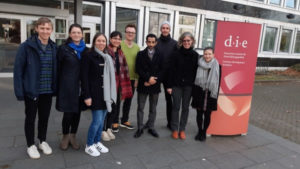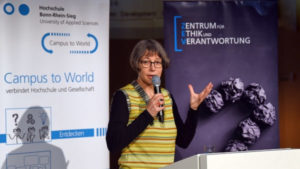Junior researchers start their field research in Jordan, Botswana and Ethiopia
Three research teams from the Postgraduate Training Programme at the German Development Institute / Deutsches Institut für Entwicklungspolitik (DIE) will start their field research in partner countries in the Global South these days. In the upcoming weeks, the research teams will address key challenges of the 21st century: digitalisation, migration and the global agenda for sustainability.
Please find below the reports of the teams on their preparations and their upcoming research stay:
DIE’s Research Team Jordan is ready for take-off

(from left to right): Daniel Oberhauser, Ronja Schamberger, Majd Al Naber, Ramona Haegele, Lukas Behrenbeck, Marwan Al Raggad, Thomas Bollwein, Ines Dombrowsky, Mirjana Koeder
The integrated implementation of the 2030 Agenda with its 17 Sustainable Development Goals (SDGs) requires the mobilization of synergies and the mitigation of trade-offs between economic, social and ecological dimensions of sustainable development. This can be a particular challenge when it comes to the governance of natural resources. In many rural-urban settings, trade-offs can be observed between SDG 2 (zero hunger), SDG 6 (clean water and sanitation), SDG 8 (decent work and economic growth) and SDG 15 (life on land). Particularly in water-scarce countries, the question arises as to how water use among different sectors can be governed in line with the 2030 Agenda principles.
Five junior researchers of the Institute’s Postgraduate Training Programme – Lukas Behrenbeck, Thomas Bollwein, Mirjana Koeder, Daniel Oberhauser and Ronja Schamberger – led by Dr. Ines Dombrowsky, Programme Chair Environmental Governance and Transformation to Sustainability, and Ramona Haegele, Researcher at DIE, will study this question. The research project will be implemented in close cooperation with two Jordanian partner institutes – the Inter-Islamic Network on Water Resources Development and Management (INWRDAM) and the West Asia-North Africa (WANA) Institute.
From early February to late April, the team will conduct research in Jordan, one of the world’s most water scarce countries. One geographical area, where agricultural, domestic and environmental users compete for shrinking groundwater resources, is al-Azraq in Eastern Jordan. The team seeks to analyse in how far the core principles of the 2030 Agenda are reflected in groundwater governance. On this basis, they will identify entry points how to improve natural resource governance in the light of the 2030 Agenda. The findings will be presented in Amman in April and in Bonn at the end of May.
Stay tuned and follow the Research Team on Twitter: @GovnexTeam!
Research team of the Postgraduate Training Programme heads towards Botswana to conduct their research project
After several months in Bonn, during which we put our heads together intensively to get our research project off the ground, the cold winter’s everyday life is coming to an end. On 26 January, we started our eleven-week research trip to Botswana together with our team leader Sebastian Ziaja. The goal of our research trip is to find out whether the use of e-government systems affects the political attitudes of citizens. Since the implementation of electronic services is becoming a global phenomenon, we consider this research project to be highly relevant.
In the first two weeks of January we received a visit from our partner Professor Sebudubudu, Dean of the University of Botswana in Gaborone, who supported us in a great manner. It was great fun to work together with him on our inception report. At the same time, we kept an eye on the work-life balance, went on a joint hike to the Drachenfels in the Siebengebirge and presented culinary highlights from the Rhineland.
After a short phase of acclimatisation to the Botswanan temperatures, we will prepare and conduct a survey and two experiments. These will be used to investigate whether there are connections between the use of e-government systems and political attitudes. The survey will be conducted in the form of a questionnaire with the help of students from the University of Botswana with 2,000 inhabitants in the capital. In parallel, we will conduct two experiments, one regarding the renewal of driving licences and the other on the submission of tax returns.
In addition to the quantitative data collected, we will be interviewing experts in the field of digitalisation and democracy.
On our twitter channel @EgovBotsTeam, we will keep you updated on our progress and experiences. Follow our journey!
Sale sentle (Goodbye on Setswana).
The third research team will be researching the municipalities as actors in the context of international aid for displaced populations in the Somali region of Ethiopia. The project is being carried out together with the Institute for Peace and Security Studies at Addis Ababa University and the Institute of Migration and Displacement Studies at Jigjiga University. Among other things, the research team will interview more than two thousand refugees and residents of the host communities.
You may follow the results and experiences of the different groups on social media in the next few weeks. You can find the research teams on Twitter at
